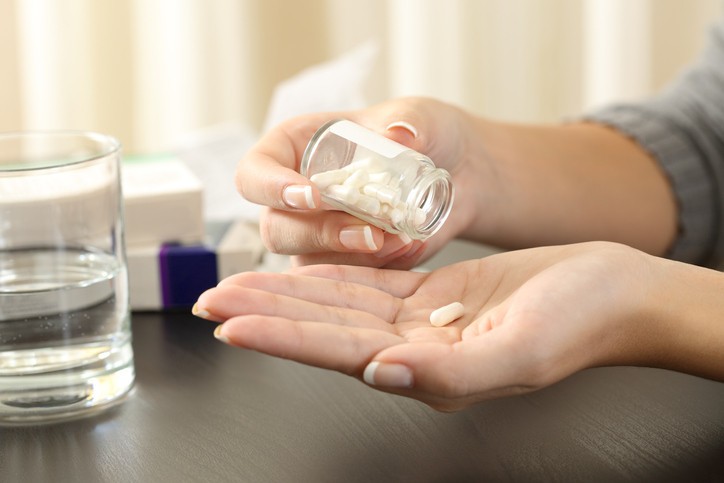Acetaminophen, the active ingredient in Tylenol and numerous over-the-counter medications, is a common remedy for pain and fever. While generally safe when used as directed, accidental overdoses can lead to serious health consequences. Understanding the safe dosage and potential risks is crucial. Billions of doses of acetaminophen are safely consumed annually, but vigilance is necessary to avoid adverse outcomes.
Understanding Acetaminophen and Its Uses
Acetaminophen effectively manages pain and reduces fever. However, unlike NSAIDs (nonsteroidal anti-inflammatory drugs) like aspirin, ibuprofen (Advil, Motrin), and naproxen (Aleve), it does not combat inflammation. A key advantage of acetaminophen is that it typically doesn’t irritate the stomach lining, making it a suitable option for individuals who cannot tolerate NSAIDs. This is especially important for older adults managing chronic pain.
 Close up of a woman taking a pill from bottle on a table
Close up of a woman taking a pill from bottle on a table
Alt: A woman takes acetaminophen for pain relief, highlighting the importance of safe dosage.
The Fine Line: Dosage and Liver Health
The difference between a therapeutic dose and a dangerous overdose of acetaminophen is relatively narrow compared to NSAIDs. While NSAIDs can cause discomfort, it requires a significantly larger quantity to reach a dangerous level. Excessive acetaminophen intake can severely damage the liver, potentially necessitating a liver transplant or even leading to death.
The body processes acetaminophen, with most of it broken down and eliminated through urine. However, a portion is converted into a liver-toxic byproduct. Exceeding the recommended dose, whether in a single instance or cumulatively over several days, can overwhelm the liver’s capacity to manage the toxin.
What’s the Safe Dosage of Tylenol?
For healthy adults, the maximum daily acetaminophen dose from all sources should not exceed 4,000 milligrams (mg). However, to err on the side of caution, it’s generally advisable to stay below 3,000 mg per day, especially with frequent use. Factors such as age, body size, and pre-existing health conditions can also influence individual tolerance. Always consult with a doctor or pharmacist if you have concerns about the appropriate dosage for you.
Key Precautions to Avoid Acetaminophen Overdose
Here are some crucial steps to ensure you stay within safe limits:
- Check Cold and Flu Medications: Over-the-counter cold and flu remedies frequently contain acetaminophen. Always read the label to understand the dosage.
- Be Aware of Milligram Strength: Acetaminophen pills come in various strengths (e.g., 325 mg, 500 mg, 650 mg). Exercise extra caution with higher-dose pills.
- Adhere to Recommended Doses: Resist the urge to exceed the recommended dosage. Smaller individuals should aim for the lower end of the recommended range (3,000 mg).
- Moderate Alcohol Consumption: Alcohol increases the production of toxic byproducts during acetaminophen metabolism in the liver. Men should limit themselves to no more than two alcoholic drinks per day while taking acetaminophen (one drink per day for women).
- Consider Potential Drug Interactions: Consult your doctor or pharmacist about potential interactions between acetaminophen and any prescription medications you are taking.
Understanding the Risks and Taking Action
Tens of thousands of individuals experience adverse effects each year from acetaminophen overdose, with several hundred cases resulting in death. However, you can mitigate this risk by carefully reading labels and adhering to recommended dosages.
| 325 mg | 500 mg | 650 mg Extended Release | |
|---|---|---|---|
| Take how many pills at a time? | 1 or 2 | 1 or 2 | 1 |
| Take how often? | Every 4-6 hours | Every 6-8 hours | Every 8 hours |
| Safest maximum daily dose for most adults | 8 pills | 6 pills | 4 pills |
| Never take more than this in a 24-hour period | 12 pills (3900 mg) | 8 pills (4000 mg) | 6 pills (3900 mg) |
Strive to take the lowest effective dose and aim for a maximum daily dose closer to 3,000 mg. If you require high doses of acetaminophen for chronic pain, consult your doctor.
Conclusion
Acetaminophen is a valuable medication for managing pain and fever. However, responsible use is paramount. By understanding the safe dosage, being mindful of combination products, and taking necessary precautions, you can minimize the risk of overdose and protect your liver health. Always consult a healthcare professional if you have questions or concerns about using acetaminophen safely.